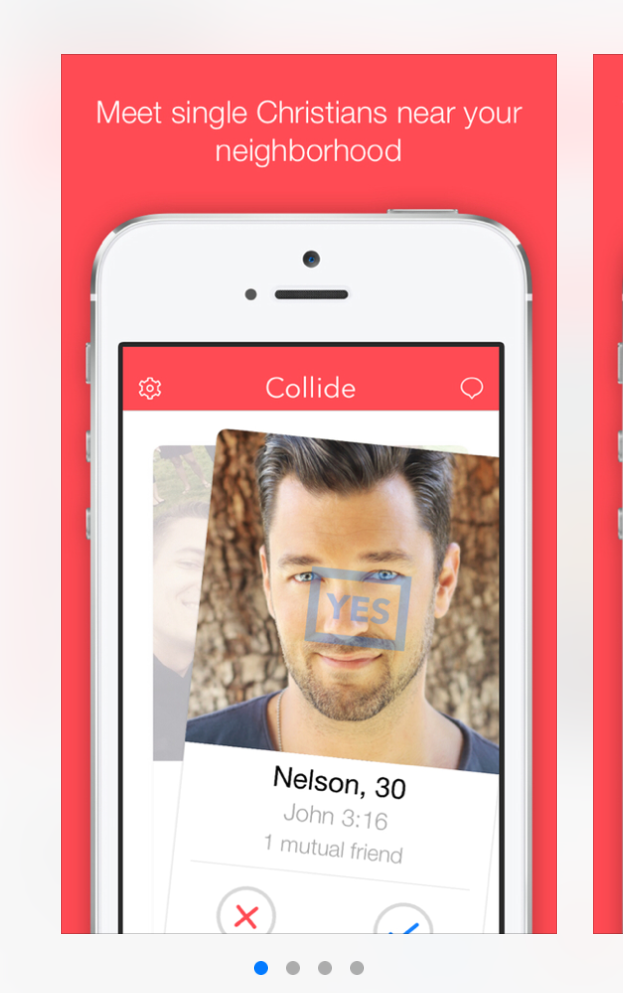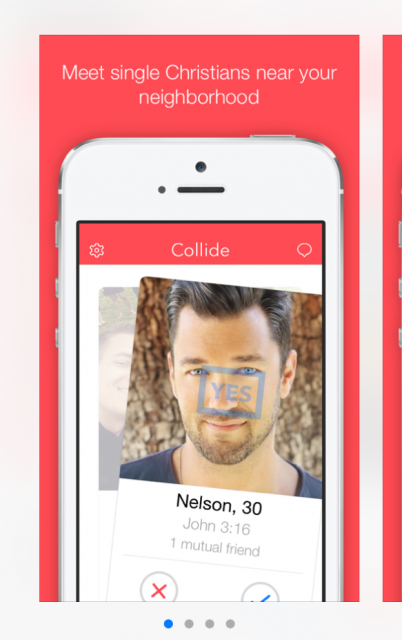The first thing I had to do is enter my favorite Bible verse. I debated for a while, thinking I could go the easy route and say it was John 3:16 or Philippians 4:13 (“I can do all things through Christ who gives me strength,”) but I was feeling cheeky so I entered Ecclesiastes 1:2 (“‘Meaningless! Meaningless!’ says the Teacher. ‘Utterly meaningless! Everything is meaningless'”). Then I entered my denomination–Protestant–and said that I’m looking for men. I allowed it to integrate with my Facebook account and I was in.
This is Collide, a new app being billed as “Tinder for Christians.” It is one of many in the dubious tradition of __________ for Christians (Netflix, yoga, clothes), and as I went through the motions of joining I wondered what good this was going to do, what perceived need it was filling. The idea of Tinder is to go on dates with your match, of course, but it’s also to make split-second judgments based on your level of physical attraction to the person in front of you and then maybe go have sex with them. What I know of Christian culture–the kind of evangelical subculture that would spawn something like this, at least–would be pretty well set against the idea of a Christian Tinder.
I was beginning to suspect that this app was not, in fact, made by actual evangelical Christians. So I kept digging. Here, my expanded list of clues:
- There was no place to enter my gender. That was sort of strange, because the evangelical subculture is not exactly known for being progressive about gender identity. Especially when it comes to dating, it’s the kind of thing that would be important for people to identify up front.
- Entering your favorite Bible verse as the one identifying factor that shows up on your profile–besides your picture–seems like exactly the kind of thing a non-Christian would think a Christian would do. Sure, Christians have favorite Bible verses, but it’s not a thing we talk about in casual conversation. “So I’m Laura, I’m a writer, and my favorite verse is Hebrews 8:1.” Maybe some people do this, but in all my years in the evangelical subculture, I’ve rarely ever seen someone mention a favorite Bible verse as a conversation-starter.
- The denomination list was, though, the real clincher for me. Here are the choices:
- Christian
- Assemblies of God
- Baptist
- Catholic
- Church of God
- Church of the Nazarene
- Congregational
- Disciples of Christ
- Episcopalian
- Evangelical
- Jehovah’s Witness
- Lutheran
- Methodist
- Mormon
- Orthodox (Eastern)
- Presbyterian
- Pentecostal
- Quaker
- Seventh-Day Adventist
I could write a dissertation on why these choices would be strange for an evangelical, but we can focus on the inclusion of Jehovah’s Witness and Mormons, whom evangelicals categorically deny are Christians. Then there’s the addition of “evangelical” and “Protestant” as denominations, both of which are larger organizing categories and nothing else. “Episcopalian,” “Methodist,” and even “Quaker” would all fall under the “Protestant” category. - Their two blog posts don’t mention God at all.
- Finally, there was the payment scale. If I wanted to find out the denomination of a person I was interested in, I would have to shell out. Same if I wanted to identify mutual friends. This is a very Silicon Valley way to create an app, but not a Christian way. That might sound weird, but I can guarantee you that if this app were created by people who identified as evangelical Christians, they would have come up with a different kind of pay scale. Christians want to avoid the appearance of loving money–whatever the reality–so they would have done an up-front payment, like eHarmony, or something else.
None of this makes Collide a bad thing, of course. But it’s been decried by some folks, and I think it’s important to point out that it may not be exactly what it seems. Then again, who of us are? That’s kind of the point. And maybe it’s a good thing that some folks who aren’t Christians are taking on the Christian demographic.
I asked the founders–Steven Gaan, Nelson Wang, and Steven Rueter–to expand on their religious backgrounds, and they confirmed what I thought. Between the three of them, one is agnostic, one is not religious, and one believes “in God but doesn’t follow a specific religion.” Wang went on to say that “The reason we made the dating app is because we’ve always been focused on one goal – helping people make deep and meaningful relationships with others. And we felt the Christian community didn’t have a good way to do this with mobile apps, so we wanted to solve that problem.”
I haven’t gotten any matches yet, and I like to think that’s more because my profile picture features me in a wedding dress than because it also features me smoking and holding a flask, but I’m not sure. It’s also possible that the dearth of new users–I’d estimate there were 20-25 men when I flipped through, total–has something to do with that. In the meantime, remember that appearances–and apps–can be deceiving.






